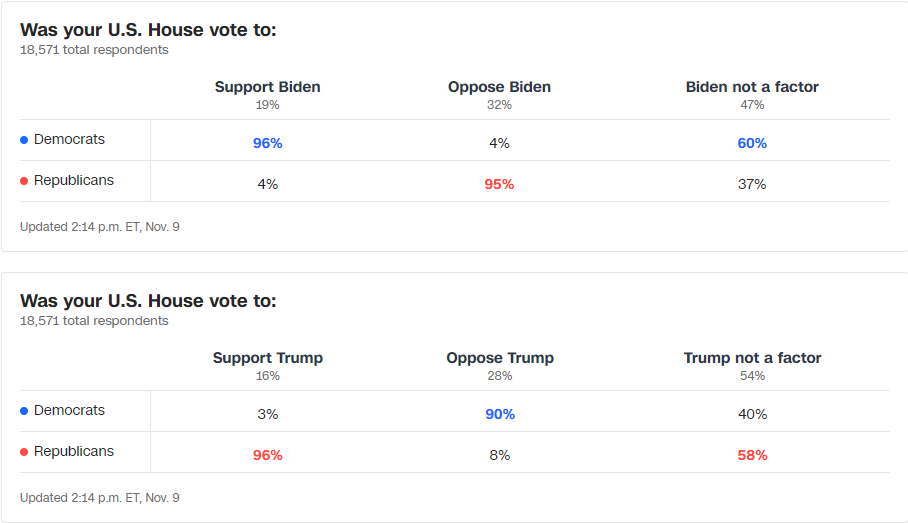For someone who claims to know something about politics, I was wrong about an awful lot in last week’s midterm elections. To wit, a collection of recent Oregon Roundup headlines:
Extreme Democrats against ‘extremism’
Oregon Dems are in real trouble
And, best of all,
The Red Wave Cometh . . . Even in Oregon
In each of those pieces, I wrote that Republicans would ride a red wave of voter discontent with inflation, crime, homelessness and Joe Biden to significant victories nationally and even in Oregon. I even had historical and polling data to back me up! I was emphatic because I thought the evidence was overwhelming.
LOL. Here’s what actually happened.
In Oregon, Democrat Tina Kotek has won the governorship, according to the Oregonian. No, it’s not official yet, but Kotek won. Republicans will no longer be in the super-minority, e.g. unable to vote down tax increases, but failed to wrest control of either chamber from the Democrats.
For Oregon Republicans, the best news is that Lori Chavez-DeRemer has won the hotly contested race for the state’s Fifth Congressional District. Oregon will send two Republicans to the U.S. House of Representatives for the first time since 1996.
The red wave I and others predicted in Oregon turned into a red ripple, with Chavez-DeRemer at its apex.
Nationally, the trend was similar. Prior to going on air last Tuesday on Bend’s KTVZ, I told my Democrat counterpart and friend Judy Stiegler, somewhat smugly I regret to inform you, that for sure the GOP would take the U.S. House and by a lot, and very probably the Senate as well. LOL, part 2.
Yes, with the Chavez-DeRemer’s help, Republicans are likely to take a slim majority in the House. The GOP’s chances of winning a Senate majority hinge on Adam Laxalt hanging on to his narrow lead in Nevada (which appears, as of this morning, to be increasingly unlikely) and Hershel Walker winning a runoff (which doesn’t actually involve running, to Walker’s disadvantage) in Georgia next month because neither candidate will receive over 50% of the vote. Walker trails his Democrat opponent Raphael Warnock 49.4% to 48.6% as of this writing. The red ripple may well result in Democrats retaining control of the U.S. Senate.
There will be no mandate for Republican policies or against Democratic ones. If anything, Democrats so far exceeding expectations in the midterm elections will be seen as a mandate for Democrats to continue doing what they’ve been doing. Democrats aren’t going to demand Biden resign in shame. Instead, it is Republicans who are questioning the
So, what happened?
Let’s start with the fundamentals. There is never one single cause for something that happens in politics. Elections are, by definition, millions or hundreds of millions of people contributing to decisions in thousands of races. Anyone who tells you there is a unifying theory of an election that explains all races is oversimplifying to an extreme. There are way too many moving parts. It’s more like trying to determine a trend line that seems to fit most races. The trend line will never fit perfectly, or even especially well because of the chaos of results. But we, as humans, look for patterns and these are the dominant patterns I see:
Donald Trump hurt Republicans in two distinct ways. First, he tipped the primary scales toward 2020 election-denying and otherwise fringe and unelectable Senate candidates in states including New Hampshire, Pennsylvania, Georgia and Arizona. His hand-selected Senate candidates in those states all failed to garner a plurality of the votes in their races (all but Walker already having lost). Trump’s choice in Ohio, JD Vance, won, but he is the exception to the rule. Trump’s influence in key GOP primaries is one of the key reasons that Democrats may well retain control of the Senate.
Second, most voters don’t like Donald Trump. According to exit polls, 39% of midterm voters had a positive view of Donald Trump; 58% viewed him negatively (by comparison, Joe Biden’s job approval was 44% positive and 55% negative). Worse yet, Trump was as much a determining factor in how people voted as was Biden:
Trump’s continued prominence in voters’ minds deprived Republicans of the biggest advantage the out-of-power party has in a midterm election against the party of an unpopular incumbent president: a clean referendum on the policies of the party in power, and the consequences of those policies.
Such a referendum is what Republicans got in 1994, the last midterm election that followed a one-term Republican presidency. I tried, briefly and unsuccessfully, to find exit poll data from 1994. However, I am confident that 90% of Democrats and a crippling 8% of Republicans did not cast their vote to oppose George H.W. Bush. Not coincidentally, in 1994, gained 54 seats in the House and eight seats in the Senate, gaining emphatic control of both chambers.
The Trump influence on 2022 was magnified by the emergence, just four days before the midterm election, stories, sourced to Trump’s inner circle, claiming that he intended to announce his third campaign for the presidency shortly after the midterm, perhaps on November 14 or 15. This ensured Trump was at the forefront of voters minds as they voted. In many races, Republicans underperformed pre-election polling, a shift from the recent trend of Democrats underperforming polling. Trump’s seizing the spotlight away from Biden and other Democrats in the waning days of the campaign is a likely explanation for at least some of that underperformance.
With as much as I got wrong about the 2022 elections, I think I was right about one. On August 4, in a piece about the Oregon governor candidates’ first debate and the potential dynamics of that race moving forward, I wrote:
Drazan has to hope that Donald Trump does not announce that he’s running for president, and that the Supreme Court does not issue any more hot-button social issue decisions before the election.
Trump’s team signaling on November 4 he would run in an announcement to be made on a specific date shortly following the election helped do the trick. While Drazan’s lead in the polls began sliding shortly prior to Trump’s announcement of his announcement, they also followed shortly on the heels of national democrats, including Joe Biden, Kamala Harris and Bernie Sanders, visiting Oregon to shine a spotlight on Trump.
Abortion mattered. On June 24, 2022, the Supreme Court issued its decision in Dobbs v. Jackson Women’s Health Organization overturning Roe v. Wade. That decision, beginning with its leak to the media months earlier, kicked a hornet’s nest of anger among pro-choice voters. Now, the Supreme Court’s job is not to win any party elections, and I believe it correctly decided Dobbs, but the decision’s impact on the 2022 midterms is undeniable. Once again to the exit polls:
Fully 60% of midterm voters were “dissatisfied” or “angry” with Roe being overturned, while only 37% were “enthusiastic” or “satisfied.” The fact that Supreme Court justices nominated by Republican presidents penned and issued Dobbs in 2022 further undermined Republicans’ attempt to make the midterm an up or down vote on voters’ dismal view the state of the country under Democratic control. Democrats were, in some places including Oregon, able to make the election not about inflation, gas prices, crime or the economy, but about abortion. This blunted expected Republican gains.
There were other factors. Trump and abortion were, I think, the two biggest factors in Republicans’ underperformance. But there were others as well. Republicans probably became complacent in some races because of the prediction of a red wave. Republicans have yet to adapt effectively to the prevalence nationwide of early and mail-in voting. Democrats had the temerity to stick to an abortion and MAGA strategy that seemed to many observers, including me, to be ill-advised. There are surely others as well.
OK, so now what?
On abortion, Republicans must do a better job of letting voters know that, in fact, widespread Democratic embrace of legal abortion to the point of birth is at least as unpopular as Republicans’ pro-life positions. This shift should be aided as the abortion debate changes focus from Dobbs to the actual policies being implemented in its wake by the states.
More importantly, if the Republican Party wants to be a national governing party, and to be consistently competitive in swing states and sometimes win blue states, it must not allow Donald Trump to lead the party any more. Trump has brought numerous new voters to the GOP, while driving numerous others away. His 2016 campaign played a central role in remaking the parties’ coalitions: the GOP coalition now more or less looks like the Trump coalition of largely rural and working class voters, with an increase in minority, especially Latino, support.
However, it is clear now that whatever Trump’s prior benefit to the GOP, he is now a weight around its neck. The combativeness with the media, focus on immigration and identifying with working class voters he displayed in 2016 and at times during his presidency is now overshadowed by his behavior since losing the 2020 election. His nearly exclusive focus on that election, persistent before and after January 6, 2021, render him unable to articulate an agenda to address the problems Americans face today. The bulk of his political energy is plowed into sustaining a lie that a significant majority of voters, including many Republicans, know to be a lie: that he won the 2020 election.
If Republicans nominate Donald Trump for president in 2024, they will almost surely lose. The appeal he had as an outsider in 2016 is long gone. His campaign will consist of a re-litigation of the 2020 election, which he already lost, many times over, in actual litigation about that election.
Fortunately for Republicans, they have an obvious successor in Florida Governor Ron DeSantis. DeSantis was one of the rare bright spots for the GOP in 2022, winning re-election by nearly 20 points over former Florida Governor Charlie Crist. Crucially, DeSantis romped to victory with coattails: GOP Senator Marco Rubio easily won re-election, Republicans picked up at least another U.S. House seats from the state and they secured super-majorities in both houses of the state legislature. DeSantis has played a major role in turning Florida from the definitive swing state to a definitively red state.
DeSantis combines a pugnacious opposition to woke-ism and its Democratic and media proponents with largely mainstream conservative policy views and a solid record of responsible, effective governance. Republicans who like winning would be well-advised to give him a shot to lead the party.







The extreme Trump push does seem to have made a very negative outcome at the polls. I really wish that the Republican party would take a better look at how the Democrats continue to win despite the lack of quality in many of those voted in. I ran a small business that competed against a well-known national competitor. I studied the competition well and put their local company out of business my first year. My passion to be "better than" led me to find the competitors "Achilles heel". I was able to convey why local businesses should advertise with my little business venture over the "known" and won the account time after time. Simple sales point, "features and benefits" might benefit the Republican's in future campaigns...just a thought.
Placing the blame on Trump due to his actions (or not) represents a cynical view of conservative voters. I have problems with Trump and with his timing and actions sometimes, but, I am still looking for a national leader that has his fire and love of America. Until someone else comes along willing to call out our current national leadership, he's my guy. Here is another view we all need to consider when falling in behind DeSantis who has qualities I admire but.....
https://theconservativetreehouse.com/blog/2022/11/11/its-the-big-ugly-and-were-here-for-it/